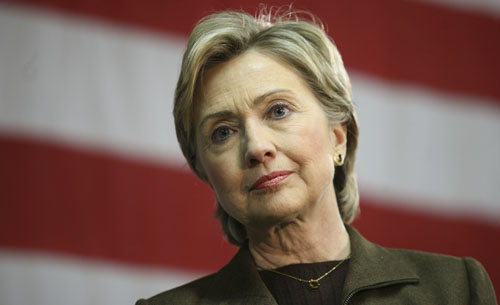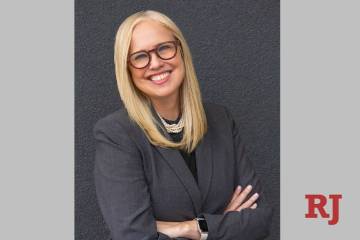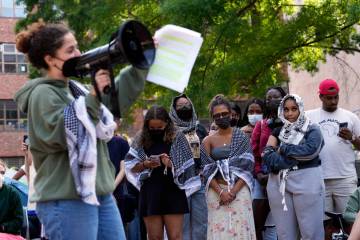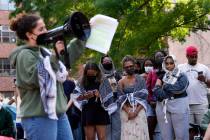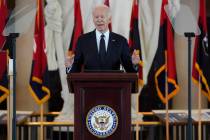Wal-Mart past dogs Clinton
A few months ago, Democratic presidential hopeful Hillary Clinton came to Henderson to tour a Smith's supermarket.
Trailed by media and staff, the New York senator and former first lady made a circuit around the store, shaking hands with stockers and clerks in red shirts and black aprons. She nodded somberly as they told her what was on their minds.
Fortunately for Clinton, the workers didn't ask her about Wal-Mart.
The workers are members of the United Food and Commercial Workers union. That union's No. 1 enemy for decades has been Wal-Mart.
Clinton once worked for the retail giant, whose labor practices are reviled in union circles. Serving on Wal-Mart's board in Arkansas, she apparently never voiced objection to the company's union-busting tactics and anti-union philosophy.
Today, she has distanced herself from Wal-Mart and remade herself as an ardently pro-labor politician.
Clinton's campaign views her failure to advocate for labor back then, which it has not disputed, as ancient history. She left the board in 1992 when her husband was running for president.
The campaign believes Clinton's current positions, not her past, are what counts. In 2005, for example, Clinton returned a donation from Wal-Mart to her Senate campaign.
"Senator Clinton believes strongly that Wal-Mart's workers should be able to unionize and bargain collectively, and that the corporation should provide health insurance coverage to its employees," campaign spokeswoman Hilarie Grey said.
The question is whether Nevada's unions, which have major clout in the state's Jan. 19 Democratic presidential nominating caucuses, will look at the old Clinton or the new Clinton when it comes to support for organized labor.
Two unions in particular, both of which are active in Nevada, have made Wal-Mart a target.
The food workers are backers of a national campaign called Wake Up Wal-Mart and once placed special emphasis on Las Vegas in their attempts to organize retail workers.
Meanwhile, the Service Employees International Union is the force behind Wal-Mart Watch, an effort to push the retailer toward practices the union considers more responsible.
In Nevada, the union of nurses and county workers hopes to decide whether and whom to endorse soon, probably this week, spokeswoman Hilary Haycock said.
Nevada was picked by Democrats to host an early caucus in 2008 in large part because of the strength of unions here. The Nevada caucus has been portrayed as a vetting of candidates' ability to appeal to organized labor.
Arkansas days
Organized labor wasn't a concern of Clinton's when she was the first lady of Arkansas.
Clinton became the first female director on the Wal-Mart board in 1986, part of company founder Sam Walton's effort to counter criticism of a lack of gender diversity.
At the time, her husband, Bill Clinton, was the state's governor. Hillary Clinton also was a partner in a major law firm in the state, of which Wal-Mart was a sometime client. She served on the company's board, with pay, for six years.
According to multiple first-person accounts reported recently, Clinton did try to sway the board in a progressive direction when it came to women and the environment. But when it came to unions, she was mum, even as the company's top union-buster served with her on the board.
Walton's, and therefore the company's, hostility to unions was nothing new even at that time. Since Walton started his first discount store in 1945, and his first Wal-Mart in 1962, he harbored a deep antipathy to government regulation and unions, said Nelson Lichtenstein, a labor historian at the University of California, Santa Barbara who has written and edited books about the retailer.
"It was in the company's DNA," he said.
In 1978, for example, Wal-Mart came down hard on Teamsters trying to organize a distribution center in Searcy, Ark. "Walton came down like a sledgehammer," is how Lichtenstein describes it. "He broke the law with impunity."
The 1980s, Bill Clinton's time in office in Arkansas, were the time of Wal-Mart's meteoric growth, when it went from a small, mostly unknown chain to the behemoth it is today.
It was in 1985 that the company really reached national prominence, when Forbes magazine declared Walton the wealthiest American. With that scrutiny came pressures, including the push to include more women in management.
A class-action gender-discrimination lawsuit against the company is still pending.
Labor has never been a powerful force in Arkansas politics, said Martin Halpern, a professor at Henderson State University in Arkadelphia, Ark., who has studied the subject.
Perhaps for that reason, Halpern said, Bill Clinton -- on whose political career Hillary Clinton makes many of her own claims to political experience -- was not a labor-friendly politician: He didn't see unions as politically useful to him.
In 1976, running for state attorney general, Bill Clinton didn't side with the unions or even stay neutral on a labor reform initiative being pushed. He came out against it.
The Waltons contributed to Bill Clinton's political campaigns, but the families weren't close, Halpern and others said. Bill Clinton was closer to Arkansas corporate interests such as Tyson Foods, which is staunchly anti-union, and the Stephens family. (Stephens Media, headquartered in Las Vegas, owns the Review-Journal.)
One notable interaction between Bill Clinton and Wal-Mart was a deal he made with Walton in 1985 to stop 100 textile jobs at a company called Farris Fashions from being outsourced to Costa Rica. The move resulted in so much good publicity that Walton expanded it to become Wal-Mart's "Buy American" initiative.
Today, many decry Wal-Mart's reliance on cheap product suppliers in China. But the "Buy American" campaign had some of the same effects on U.S. businesses, Lichtenstein said.
"The downside of it was, Walton and Wal-Mart really took over these companies. The companies supplying Wal-Mart ... became completely controlled by the company -- 'no unions, keep wages low, only produce what we tell you to,'" he said.
Even Farris Fashions, Clinton and Walton's show horse, became captive. A union organizer was told by a Farris executive "something like, 'If the union gets in here, Sam will cut us off immediately and turn this place into a chicken coop,'" Lichtenstein said.
Las Vegas fight
For years, unions have done battle with Wal-Mart. One of their major efforts started here.
In the late 1990s, the UFCW mounted its first major push to organize workers at Wal-Mart. The epicenter of the campaign was Las Vegas.
Academics, union officials and published reports attest that Las Vegas was going to be the union's big chance. Union organizers still wistfully refer to Las Vegas as "ground zero" of the organizing effort.
But Wal-Mart came in with big guns, employing both legal and illegal tactics to keep the union out.
Earlier this year, a judge ruled that Wal-Mart broke the law in punishing Las Vegas workers who wanted to organize. But the penalties amounted to little more than posting notices in employee break rooms.
The union continues to post pickets outside some local Wal-Mart stores.
Elsewhere, Wal-Mart has used similar tactics and has closed stores rather than let organized labor in. When a union won an election at a Wal-Mart meat counter in Texas, Wal-Mart shut down its meat counters across the country.
The food workers union has switched tactics. Its current Wake Up Wal-Mart campaign focuses on staining the company's public image rather than organizing workers.
The SEIU's Wal-Mart Watch has a similar thrust.
Wal-Mart's critics say that because it is the United States' largest private employer, its practices trickle down to other businesses, hurting wages, benefits and working conditions everywhere.
Wal-Mart counters that its hourly pay for average workers is substantially higher than the minimum wage and that it helps the poor by selling cheap goods. In recent years, it has intensified efforts to improve its reputation with environmental and health care initiatives.
Wal-Mart's media offices didn't return phone calls seeking a response to labor's criticisms.
UFCW's director of collective bargaining, Bill McDonough, dismissed the argument that Wal-Mart does good things that outweigh its negative effects.
"At what expense are American workers saving money at Wal-Mart?" he said. "The cost to working people in this country is far more."
Anyone who purports to support working people, he said, should oppose Wal-Mart.
"It's not just retail jobs. Wal-Mart undermines manufacturing jobs by pushing them overseas to China," said McDonough, a former president of the union's Nevada local. "People should be very much concerned about that. It impacts every working person."
The new Hillary
To the unions, the Wal-Mart issue is black and white. They say the chain has had nothing but negative effects.
In a debate in April, Clinton was asked about Wal-Mart and called the company a "mixed blessing."
She added, "When Wal-Mart started, it brought goods into rural areas. ... And it gave people a chance to stretch their dollar further. But as they grew much bigger, though, they have raised serious questions about the responsibility of corporations and how they need to be a leader when it comes to providing health care and having safe working conditions and not discriminating on the basis of sex or race or any other category."
Like the other Democratic candidates, Clinton has talked tough on labor issues when she has come to Nevada.
Last month, she told sheet metal workers union members in Las Vegas, "I can guarantee you, when I'm president, your voices are going to be heard right inside the White House."
She continued, "I think it's pretty simple. You can't go around and claim that you're pro-worker if you're anti-union. You can't say that you're pro-family if you're anti-labor. You can't say you stand for the middle class if you don't do everything possible to give people the dignity and the respect, the compensation and benefits that should go with a middle-class lifestyle."
Clinton has been rewarded for her outspokenness on labor's behalf. She has been endorsed by unions that represent nearly 4 million workers nationwide and about 18,000 in Nevada, according to the campaign.
Even UFCW, the union that would organize Wal-Mart, is supporting Clinton in Nevada, according to Michael Gittings, the secretary-treasurer of Local 711. He said it's not a formal endorsement, but the union's 7,000 members in Nevada will be helping Clinton's campaign. The decision was made quietly a few weeks ago.
Clinton, Gittings said, was the only candidate to meet specifically with UFCW members in Nevada and has the right positions on issues the union cares about, especially universal health care.
Gittings said he knew Clinton had served on Wal-Mart's board but he didn't believe she'd ever been an enthusiastic supporter of the company. As president, when it comes to Wal-Mart, "I don't think she'd pull any punches," he said.
The 17,500-strong Nevada SEIU has narrowed its choices to three candidates: Clinton, former North Carolina Sen. John Edwards and Illinois Sen. Barack Obama.
The union's board will endorse a candidate if he or she can secure the support of a supermajority of members, Haycock, the SEIU spokeswoman, said. All three candidates have met privately with SEIU members in Nevada.
"We think all of them are great," Haycock said. "We're very lucky to have such a strong field, so now we're drilling down on things like their health care plans, electability, where do they stand on supporting the labor movement."
The other two candidates have their own Wal-Mart ties. Edwards once owned Wal-Mart stock, and Obama's wife sat on the board of a Wal-Mart supplier.
Since the SEIU in October told states they could make endorsements independently, 12 have endorsed Edwards, five Obama, and none Clinton.
The Clinton campaign hopes it can compete for the union's blessing in Nevada.
"Through many personal meetings and interactions, she (Clinton) has made it clear to Nevada union members that she is their ally," Clinton spokeswoman Grey said. "Nevada unions know that as president, Senator Clinton will continue to stand with the labor movement to improve our nation's economy and strengthen the middle class."
Lichtenstein, the Wal-Mart scholar, said that kind of rhetoric isn't surprising from any Democratic candidate, especially in Nevada.
"The future of the Democratic Party lies in the revitalization of the union movement," he said. "If Hillary Clinton was too dumb to see that 20 years ago, I'm sure she sees it now."
Contact reporter Molly Ball at mball @reviewjournal.com or (702) 387-2919.
2008 ELECTIONSGet more news, voter information



